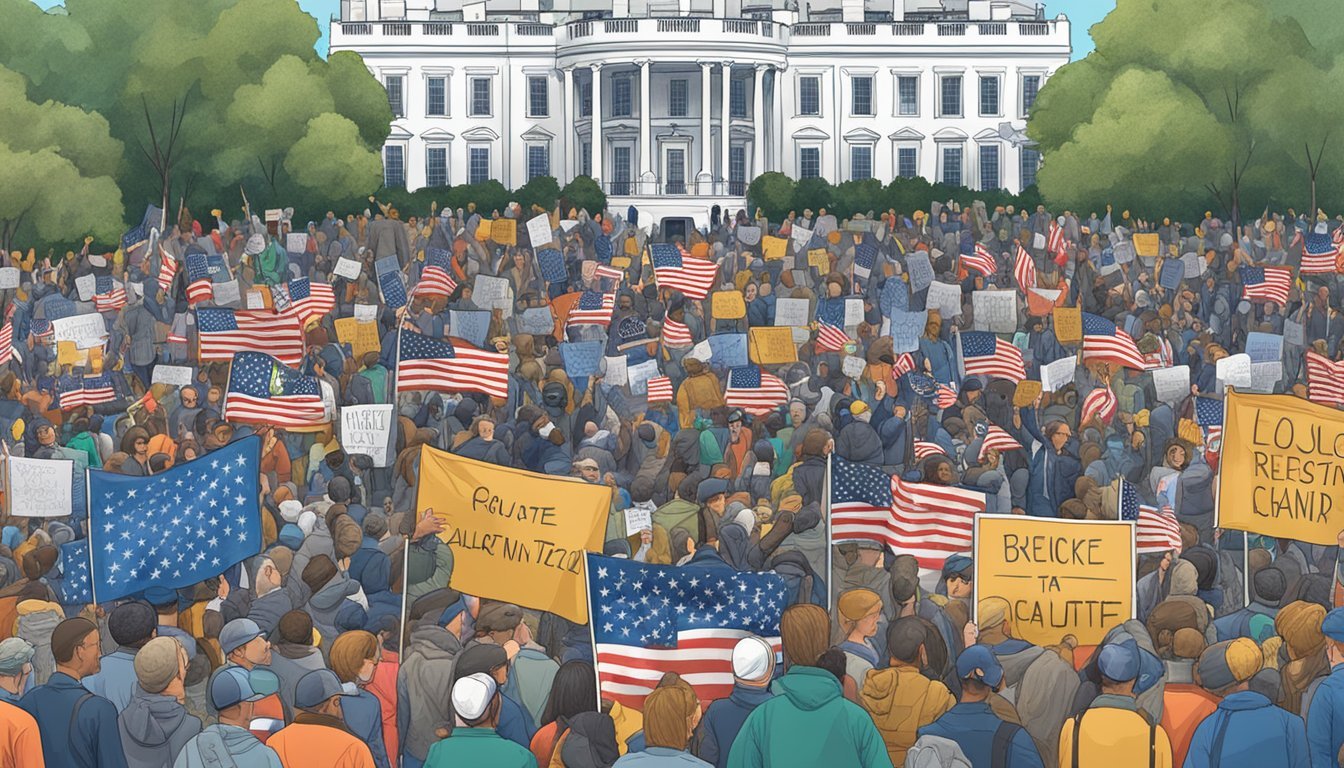Presidential Appearances Draw Crowds Nationwide
Former President's Upcoming Rallies and Appearances
Donald Trump's campaign events continue to draw significant attention as the 2024 presidential race heats up. The former president's rallies and appearances remain a cornerstone of his political strategy, attracting large crowds of supporters across key battleground states.
Trump's campaign schedule includes numerous rallies and bus tours featuring prominent Republican figures, aiming to energize his base and sway undecided voters. These events often take place in crucial swing states like Pennsylvania, Michigan, and North Carolina, where Trump hopes to secure electoral victories.
As election day approaches, the frequency and intensity of Trump's campaign events are likely to increase. His team coordinates appearances in strategic locations, focusing on areas where voter turnout could make a decisive difference in the outcome of the election.
Political Career Overview
Donald Trump's political career has been marked by unconventional approaches and significant impact. His journey from businessman to president reshaped American politics and the Republican Party.
Election Campaigns
Trump's 2016 presidential campaign defied expectations. He secured the Republican nomination despite lacking political experience. His populist message and "Make America Great Again" slogan resonated with voters.
Trump won the 2016 election against Hillary Clinton in a surprising upset. He lost the popular vote but secured an Electoral College victory.
In 2020, Trump ran for reelection against Joe Biden. The campaign occurred during the COVID-19 pandemic. Trump lost both the popular vote and Electoral College.
Trump announced his candidacy for the 2024 presidential election. He secured the Republican nomination despite legal challenges.
Key Political Positions
Trump championed an "America First" foreign policy. He renegotiated trade deals and imposed tariffs on China.
Immigration was a central focus. Trump pushed for a border wall with Mexico and implemented travel bans.
He cut taxes and regulations to stimulate economic growth. Trump appointed three conservative justices to the Supreme Court.
On climate change, Trump withdrew the U.S. from the Paris Agreement. He rolled back environmental regulations.
Influence on the Republican Party
Trump transformed the GOP's platform and voter base. He shifted the party towards populist and nationalist positions.
His loyal supporters became a powerful force in Republican politics. Many GOP candidates sought Trump's endorsement.
Trump's claims of election fraud in 2020 divided the party. Some Republicans embraced his assertions, while others distanced themselves.
His influence continues to shape Republican primaries and policy positions. Trump remains a central figure in the party's future direction.
Significant Election Events
Donald Trump's 2024 presidential campaign featured intense campaigning across key battleground states, large-scale rallies, and high-stakes debates that shaped the election landscape.
2024 Election Campaign Trail
Trump focused heavily on swing states crucial to his electoral strategy. He made multiple stops in Pennsylvania, Michigan, North Carolina, and Arizona. In Michigan, Trump held rallies in Grand Rapids, Warren, and Portage, emphasizing economic policies and manufacturing jobs.
Pennsylvania saw Trump visit Lititz and other towns, discussing energy policy and fracking. North Carolina featured prominently, with events in Selma, Raleigh, Greensboro, and Kinston highlighting agricultural issues and military support.
Trump's Arizona appearances centered on border security and immigration reform. The campaign trail also included stops in Georgia, with a notable rally in Macon.
Rallies and Public Gatherings
Trump's rallies remained a cornerstone of his campaign strategy. These events drew large crowds and garnered significant media attention. In Michigan, a Grand Rapids rally saw over 20,000 attendees, while the Warren gathering focused on auto industry workers.
The North Carolina rallies in Selma and Greensboro featured guest appearances by local Republican leaders. Trump's Pennsylvania events, particularly in Lititz, emphasized energy sector jobs and rural voter outreach.
Security measures were heightened at these gatherings following an alleged assassination attempt at a Butler, Pennsylvania event in July 2024.
Debates and Political Engagements
Trump participated in several high-profile debates against his opponents. These televised events covered topics such as the economy, foreign policy, and healthcare. A notable exchange occurred during the first debate, where Trump clashed with his rival over COVID-19 response strategies.
Town hall events provided opportunities for direct voter interaction. In Portage, Michigan, Trump fielded questions on manufacturing and trade policies. A virtual town hall focused on senior citizens' concerns in Arizona and Florida.
Trump also engaged in televised interviews, including a contentious exchange with a major network anchor discussing election integrity claims.
Alliances and Endorsements
Donald Trump's 2024 presidential campaign has garnered support from various political figures and public personalities. These endorsements span across party lines and include both long-time allies and unexpected supporters.
Political Allies
Senator JD Vance of Ohio has emerged as a key supporter of Trump's 2024 bid. Vance, once a critic, now actively campaigns for the former president. Eric Trump continues to play a crucial role in his father's political endeavors, often speaking at rallies and media events.
The campaign has secured endorsements from several Republican governors and members of Congress. Some former Trump administration officials have also pledged their support. These alliances aim to bolster Trump's credibility within the GOP and appeal to conservative voters.
Celebrity and Public Figures
Trump's campaign has attracted endorsements from various celebrities and public figures. Some notable supporters include athletes, actors, and media personalities. These endorsements often generate significant media attention and can influence public opinion.
Interestingly, some unexpected figures have voiced support for Trump. While rare, a few Democrats have crossed party lines to endorse him. The campaign actively promotes these endorsements to showcase broad appeal.
It's worth noting that Vice President Kamala Harris and former President Bill Clinton have not endorsed Trump and actively campaign against him.
Policy and Governance
Donald Trump's presidency was marked by significant policy shifts across domestic and international spheres. His administration pursued a conservative agenda focused on immigration restriction, deregulation, and an "America First" approach to foreign affairs.
Domestic Policies
Trump's domestic policy centered on immigration control and border security. He issued executive orders to restrict entry from several predominantly Muslim countries and suspended refugee admissions. The administration pushed for the construction of a wall along the U.S.-Mexico border.
Trump rolled back environmental regulations, withdrawing the U.S. from the Paris Climate Agreement. He appointed conservative judges to federal courts, including three Supreme Court justices.
The administration implemented tax cuts through the Tax Cuts and Jobs Act of 2017. This legislation reduced corporate tax rates and modified individual tax brackets.
Foreign Policies
Trump's "America First" doctrine reshaped U.S. foreign policy. He renegotiated trade agreements, including NAFTA, which became the USMCA.
The administration took a hard line on China, imposing tariffs and initiating a trade war. Trump met with North Korean leader Kim Jong-un, marking a shift in diplomatic approach.
He moved the U.S. embassy in Israel to Jerusalem and brokered normalization agreements between Israel and several Arab states.
Economic Strategies
Trump's economic policies focused on deregulation and tax cuts to stimulate growth. The administration reduced business regulations across various sectors.
Job creation and low unemployment were key priorities. Trump emphasized bringing manufacturing jobs back to the U.S. and renegotiating trade deals to benefit American workers.
The stock market saw significant gains during his tenure, though economic disparities persisted. The COVID-19 pandemic led to unprecedented economic challenges in 2020, prompting massive stimulus measures.
Public and Media Relations
Donald Trump's public appearances and media strategy are key components of his political events. He leverages both traditional and new media platforms to communicate his message and engage supporters.
Press Conferences and Interviews
Trump frequently holds press conferences and gives interviews to various media outlets. He often uses these opportunities to address current issues and promote his agenda. In New York City, Trump has held notable press events at iconic locations like Madison Square Garden.
These appearances allow him to directly reach voters and shape public narratives. Trump's press conferences are known for their confrontational style, with the former president often engaging in heated exchanges with reporters.
He also participates in one-on-one interviews with both friendly and critical media figures. These conversations provide a platform for Trump to elaborate on his policies and defend his actions in office.
Social Media Presence
Trump's social media strategy plays a crucial role in his public relations efforts. He uses platforms to bypass traditional media and communicate directly with his base.
His posts often generate significant attention and drive news cycles. Trump's social media activity includes sharing updates about upcoming rallies, commenting on current events, and criticizing political opponents.
After being banned from major platforms following the January 6th Capitol riot, Trump launched his own social media platform. This move allows him to maintain a direct line of communication with supporters while avoiding content moderation on other sites.
Trump's social media presence remains a powerful tool for mobilizing his base and shaping public discourse around his events and political activities.
Election Campaign Strategy
Donald Trump's 2024 election campaign focuses on targeted outreach in key states and energizing his base through strategic voter engagement efforts.
Target States and Locations
Trump's campaign strategy emphasizes battleground states crucial for electoral victory. The former president is concentrating on Michigan, North Carolina, and Wisconsin - states that played pivotal roles in previous elections.
Trump is also making stops in Virginia, despite it being considered a likely win for his opponent. His team is exploring opportunities in unexpected locations to expand his electoral map.
The campaign has scheduled events in cities like Reading and Pittsburgh in Pennsylvania, aiming to shore up support in this key swing state. Trump is also targeting Gastonia, North Carolina and Salem, Virginia to rally his base in these regions.
Voter Engagement Efforts
Trump's voter engagement strategy relies heavily on large rallies and direct messaging to supporters. His campaign is utilizing a playbook similar to his 2020 run, focusing on energizing his core base rather than broadening his appeal to moderate voters.
The former president's team is leveraging social media and targeted advertising to reach voters. They are emphasizing issues that resonate with his supporters, such as immigration and the economy.
Trump's campaign is also implementing a ground game in key states, organizing door-to-door canvassing and phone banking efforts. These initiatives aim to boost turnout among his most fervent supporters and identify potential new voters.
The campaign is paying special attention to suburban areas, where Trump's support has wavered in past elections. Events in places like Scottsdale, Arizona and Las Vegas, Nevada are part of this strategy to regain ground in these critical regions.
Controversies and Legal Affairs
Donald Trump's presidency and business career have been marked by numerous legal challenges and political disputes. These range from lawsuits related to his business practices to investigations into his conduct as president.
Notable Litigations
Trump has faced multiple lawsuits throughout his career. In 2024, he was involved in a case regarding a 2015 incident outside Trump Tower. Five protesters sued Trump, alleging his security staff used excessive force against them during a campaign event.
The former president also dealt with legal issues related to his handling of classified documents. A judge dismissed charges against Trump for allegedly keeping classified materials at his Mar-a-Lago residence after leaving office.
Trump's business practices have come under scrutiny as well. He has faced lawsuits concerning various aspects of his real estate and other business ventures.
Political Disputes
Trump's political career has been fraught with controversies. During the 2016 election, a dispute arose concerning Latino voter turnout in Nevada during early voting.
His presidency saw numerous investigations, including a probe into Russian interference in the 2016 election. These investigations continued to impact his political career even after leaving office.
Trump has often framed his legal battles as political attacks. He has treated court appearances as campaign events, blending his legal defense with his re-election efforts for the 2024 presidential race.
His approach to these controversies has been to maintain a combative stance, frequently denouncing investigations as politically motivated.
Impact on American Society
Donald Trump's presidency significantly altered American society, influencing cultural norms and economic policies. His tenure sparked intense debates and deepened existing divides across the country.
Cultural Influence
Trump's brash communication style and use of social media reshaped political discourse. His "America First" rhetoric resonated with many supporters, particularly in places like Rome, GA. This approach intensified discussions on immigration, nationalism, and identity politics.
Trump's presidency saw increased political polarization. His rallies, like those held in Milwaukee, Wisconsin, energized his base but also fueled opposition. Media coverage of Trump dominated news cycles, affecting public attention and trust in institutions.
The Trump era witnessed a rise in political activism. Movements like the Women's March and Black Lives Matter gained momentum in response to his policies and statements. These cultural shifts highlighted deep divisions in American society.
Economic Impact
Trump's economic policies centered on tax cuts and deregulation. The 2017 Tax Cuts and Jobs Act reduced corporate tax rates, aiming to stimulate economic growth. This led to short-term stock market gains and increased business optimism.
His administration's focus on trade renegotiations and tariffs, particularly with China, reshaped global economic relationships. These actions impacted industries across the U.S., including manufacturing in areas like Milwaukee, Wisconsin.
The COVID-19 pandemic presented unprecedented economic challenges. Trump's response, including stimulus measures and calls to reopen the economy, sparked debates on public health versus economic stability. The pandemic's economic fallout became a defining issue of his presidency's final year.




